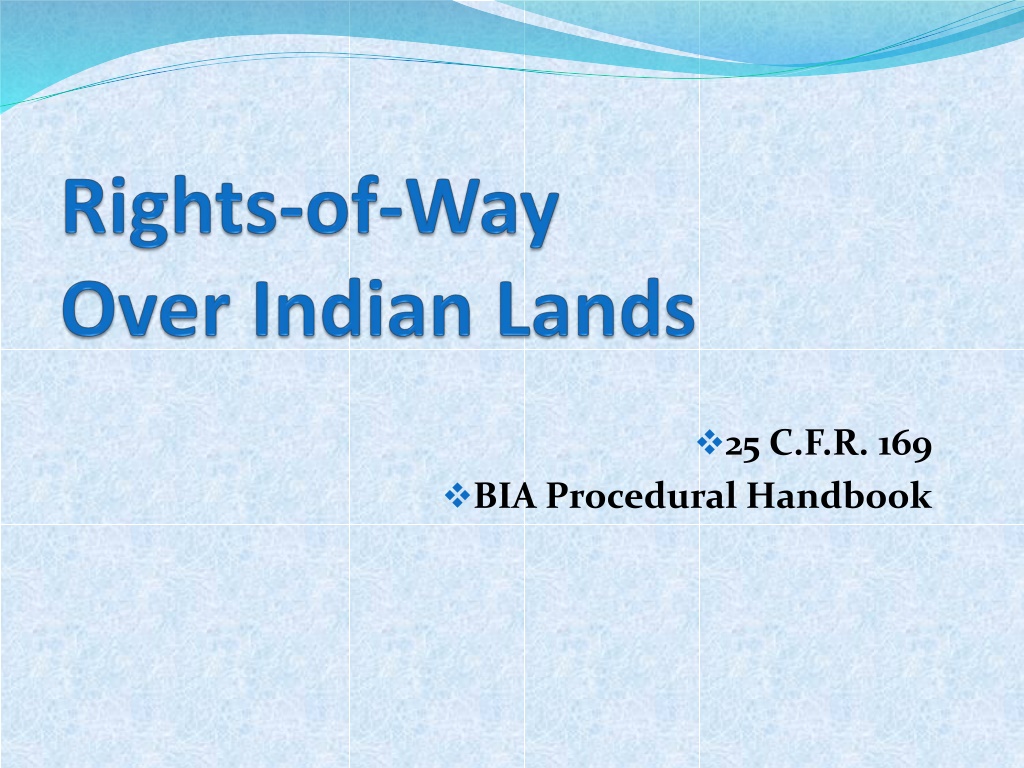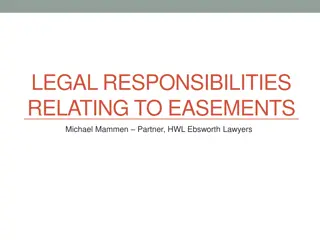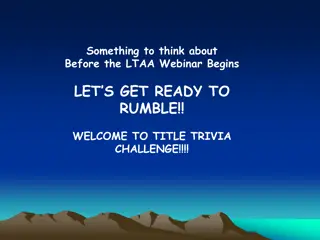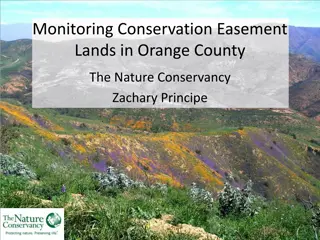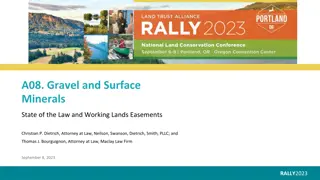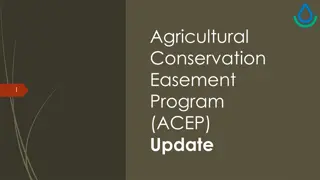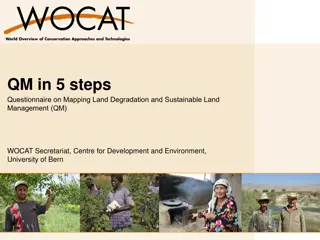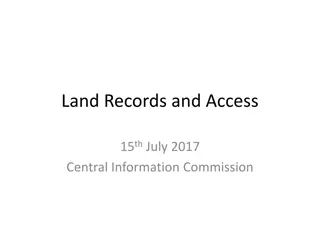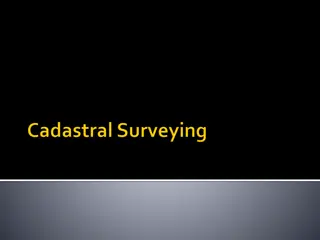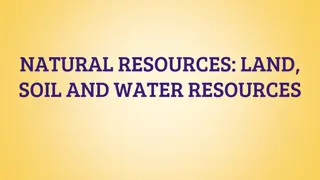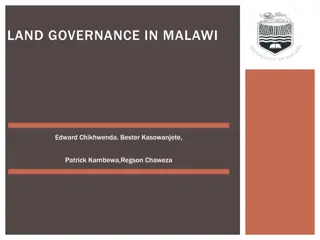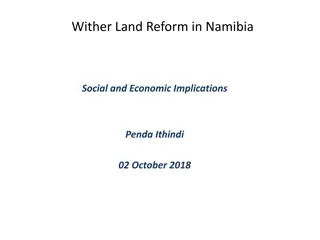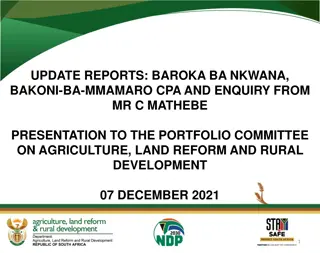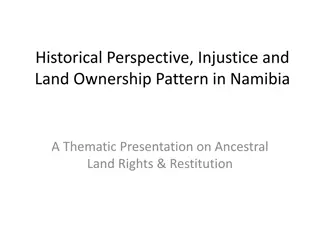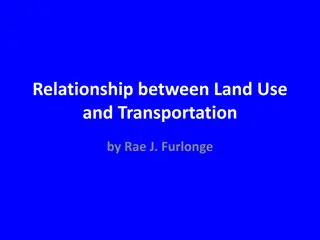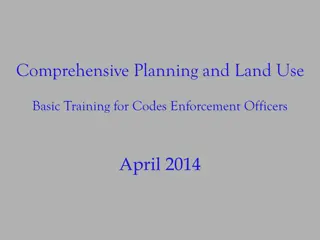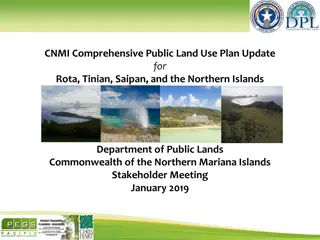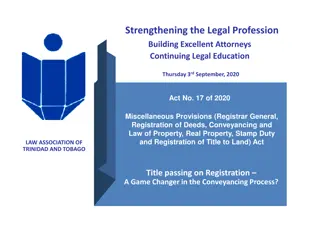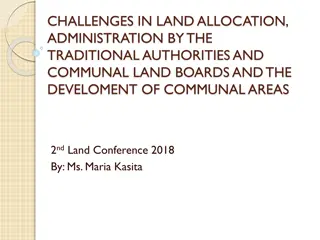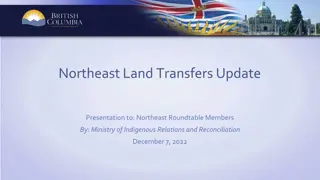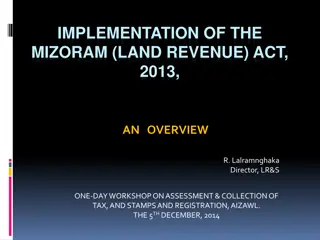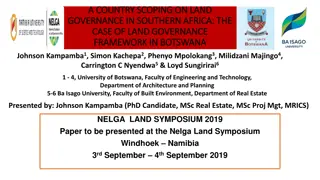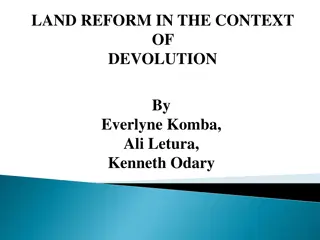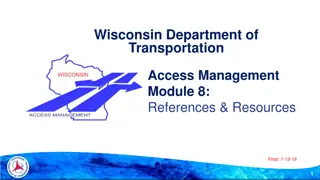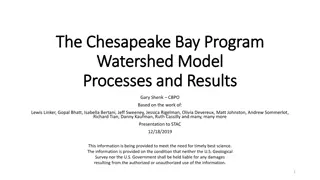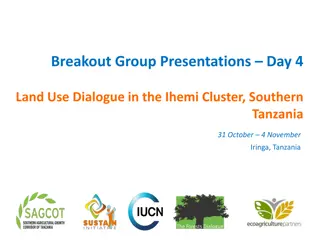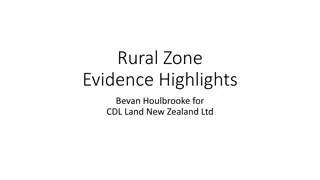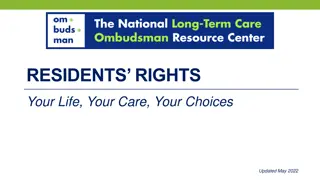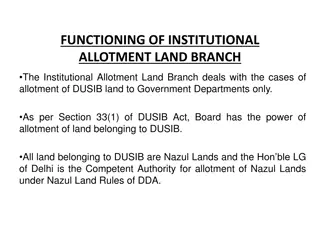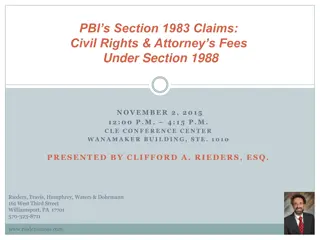Understanding Easements and Rights-of-Way in Land Use
Learn about the differences between an easement and a right-of-way, when an approved grant of easement for right-of-way is required, the requirements to obtain an easement, where to start the process, and how to identify the land affected by a proposed right-of-way.
Uploaded on Sep 26, 2024 | 0 Views
Download Presentation

Please find below an Image/Link to download the presentation.
The content on the website is provided AS IS for your information and personal use only. It may not be sold, licensed, or shared on other websites without obtaining consent from the author. Download presentation by click this link. If you encounter any issues during the download, it is possible that the publisher has removed the file from their server.
E N D
Presentation Transcript
25 C.F.R. 169 BIA Procedural Handbook
What is an Easement vs. Right-of-Way An easement is a right one has in the land of another created by a grant, reservation, agreement, prescription or necessary implication. Easement of necessity granted by a court when it is determined said easement is absolutely necessary for use and enjoyment of land (landlocked parcels, commonly). Prescriptive easement granted by a court upon the presumption that a written easement existed after a period of open and continuous use of the land. A right-of-way is a strip of land (noun) used or the right granted to pass over the land of another (verb).
When is an approved grant of easement for right-of-way required? When a project encumbers restricted trust land (allotments), regardless of who is the applicant. When a project encumbering Tribal or restricted trust land is funded by a source requiring title evidence of encumbrance. When the grantee of easement over Tribal land is an entity outside the tribal government. When NEPA requires Federal action. When the landowner requires or desires title evidence of encumbrance. When there is a change in location or status of a previously granted right- of-way.
What are the requirements to obtain easement? Application for Permission to Survey + Authority of Officers to Execute Documents + Land Description Review + Consent of Landowner For Survey + State Certified Corporate Charter* + Certified Copy of Resolution or By-Laws* + Articles of Partnership or Association* + State Business License* + Damage Deposit (double estimated)* + Title Status Report + Right-of-Way Application (in triplicate) + Survey Plat (in triplicate) + Field Notes + Applicant s Certificate + Engineer s Affidavit + Landowner s Consent for Right-of-Way + Field Inspection (notes) + Appraisal + NEPA Document + (Evidence of) Consideration for Rights Granted (compensation) = Grant of Easement for Right-of-Way Required Documents Pursuant to 25 C.F.R. 169 and national and regional policy and procedure, these documents are required to process an application for right-of-way. *if applicable
Where is the land? Identify land affected by the proposed right-of-way Step 1: Land title status The Applicant submits the Request for Title Status Report as well as maps of general location to: Self-Governance Tribal Realty Department 638 Tribes BIA Realty Department
Who is the applicant? Step 2: Evidence of Authority of Officers to Execute Documents The Applicant will submit the Evidence of Authority form and other applicable documents to: Self-Governance Tribal Realty Department 638 Tribes BIA Realty Department
Who is the landowner? Land ownership defined: Tribal Trust Land Land held in trust by the United States of America for the Tribe or Band. Tribe or Band consent for its members/constituents. Allotments (restricted trust land) Usually multiple owners on title, which can include tribal government ownership. Consent must be obtained by majority.
How does the landowner give consent? Tribal Trust Land Tribal government grants consent by Tribal Council Resolution. **** Requirements that must be identified in the Resolution: 1.) Term (Length of time) 2.) Compensation 3.) Legal Description Allotted (restricted trust land) Individual consent forms obtained by the applicant.
169.3 Consent of landowners: (a) No right-of-way (or permission to survey) shall be granted across tribal land without prior written consent of the Tribe (Band). Please familiarize yourself with 169.1 Definitions (b) No right-of-way (or permission to survey) shall be granted across individual trust land without prior written consent of the landowners and approval of the Secretary with the following exceptions: 169.2 Purpose and scope of regulations
169.3 Consent of landowners continued (c) The Secretary may issue permission to survey and may grant rights-of way over individually owned lands without consent when: (1) Owner is a minor or non compos mentis (2) For non-consent/non-response with majority consent of landowners (3) Whereabouts unknown (4) Undetermined heirs (un-probated estate of deceased owner) Highly fractionated land where grant of right-of-way will cause no substantial injury to land or any owner thereof. (5)
How is consent shown? Step 3: Evidence of landowner consent Landowner consents for survey (either individual or by Tribal Resolution or both) are obtained by the Applicant, and are submitted to: Self-Governance Tribal Realty Department 638 Tribes BIA Realty Department
Permission to survey for right-of-way is granted. Step 4: Application for permission to survey Permission to survey application, accompanied by evidence of landowner permission, damage deposit (where applicable) and other applicable documents, is submitted to: Self-Governance Tribal Realty Department 638 Tribes BIA Realty Department
169.4 Permission to survey Anyone desiring to obtain permission to survey for a right-of-way across individually-owned, tribal or Government land must file a written application with the Secretary. The application shall: Adequately describe the proposed project, including purpose and general location, and be accompanied by the written consents required by 169.3, and Demonstrate satisfactory evidence of the good faith and financial responsibility of the applicant, and Be accompanied by a check or money order for twice the estimated damages as a result of the survey
169.4 Permission to survey continued The Application shall also contain: Indemnification agreement against liability by the US, landowners and occupants of land for injury or loss of life as a result of the survey. If applicant is an agency or instrumentality of state or Federal Government, damage deposit is waived (per Federal law). Corporate applicants must provide copy of corporate charter or articles of incorporation, certified copy of resolution or bylaws authorizing application. If applicant is located in a different State, certificate that Applicant is authorized to do business from applicable State.
Permission to survey BIA Realty reviews materials submitted for permission to survey. If a complete application for permission to survey, with supporting documentation and landowner s consent, is received, BIA Realty grants Applicant permission to survey. Typically this approval is granted via a letter to the applicant. BIA Realty recommends that the Applicant also requests permission for appraisal when seeking permission to survey. Permission to survey is not permission to construct!
Application Process Phase 1 Authority of Officers to Execute Documents* Start Right-of-Way Proposed Request Title Status Report And supporting documentation/damage deposit Application for Permission to Survey SUBMIT AS APPLICATION PACKAGE! Landowner Consent(s) Self-Governance 638 Tribes BIA Realty Department Tribal Realty Department STOP Permission to Survey Granted by BIA
Completion of survey Step 5: Surveying trust lands Upon approval of application for permission to survey, the Applicant will perform a survey on the affected land. Completed surveys are submitted to: Self-Governance Tribal Realty Department 638 Tribes BIA Realty Department Upon receipt of the survey, it will be submitted to the Bureau Indian Land Surveyor (BILS) for a Legal Description Review (LDR) and approval
Surveys (a) Maps shall accompany the right-of-way application. Field notes shall also accompany the application. The width of the right-of- way shall be clearly shown on the maps. (b) A separate map shall be filed for each section of 20 miles of right-of-way. The map of the last section of right-of-way may include any excess of 10 miles or less. (c) The scale of maps showing the line of route normally should be 2,000 feet to an inch, but can be drawn to a larger scale when necessary. (d) Maps shall show the allotment number of each allotted tract, and shall clearly designate each tract affected, listing sections, townships and ranges of lands crossed. 169.6 Maps
Field notes of the survey shall appear along the line indicating the right-of-way on the maps, unless the maps would be too crowded to be easily legible, in which event the field notes may be filed separately in such form that they may be folded readily for filing. Where field notes are placed on separate paper, it will be necessary to place on the maps only a sufficient number of station numbers so as to make it convenient to follow the field notes. The field notes shall be typewritten, and be sufficiently complete so as to permit the line indicating the right-of-way to be readily retraced on the ground. They shall show whether the line was run on true or magnetic bearing, and in the latter case, the variation of the needle and the date shall be stated. One or more bearings must be given. The 10-mile sections must be indicated and numbered on all lines of roads submitted. 169.7 Field Notes
The terminal of the line of route shall be fixed by reference of course and distance to the nearest existing corner of the public survey. The maps, as well as the engineer s affidavit and the applicant s certificate, shall show these connections. (a) 169.8 Public Survey When either terminal of the line or route is upon unsurveyed land, it must be connected by traverse with an established corner of the public survey if not ore than 6 miles distant from it, and the single bearing and distance from the terminal point to the corner computed and noted on the maps, in the engineer s affidavit and the applicant s certificate. The notes and all data for the computation of the traverse must be given. (b)
When the distance to an established corner of the public survey is more than 6 miles, this connection will be made with a natural object or a permanent monument which can be readily found and recognized, and which will fix and perpetuate the position of the terminal point. The maps must show the position of such mark, and course must be given an accurate description of the mark and full data concerning the traverse, and the engineer s affidavit and the certificate on the maps must state the connections. 169.9 Connection with natural objects 169.10 Township and section lines Whenever the line of survey crosses a township or section line of the public survey, the distance to the nearest existing corner shall be noted. The maps shall show these distances and the station numbers at the points of intersection. The field notes shall show these distances and the station numbers.
Rights-of-Way over Indian Lands There shall be subscribed on the maps of definite location an affidavit executed by the engineer who made the survey and a certificate executed by the applicant, both certifying to the accuracy of the survey and maps and both designating by termini and length the line of route for which the right- of-way application is made. (a) 169.11 Affidavit and certificate Maps covering roads built by the BIA which are transferred to a county or State government shall contain an affidavit as to the accuracy of the survey executed by BIA; the affidavit is by an authorized county or State officer who certifies acceptance of the transfer and satisfaction with the accuracy of the survey and maps. (b)
Affidavit and Certificate Step 6: Submit Engineer s Affidavit and Applicant s Certificate If not published within survey maps, these documents are executed separately, and submitted to: Self-Governance Tribal Realty Department 638 Tribes BIA Realty Department
Environmental compliance Step 7: NEPA compliance The Applicant will complete the National Environmental Policy Act (NEPA) Environmental Assessment Questionnaire and submit to: Self-Governance Tribal Realty Department 638 Tribes BIA Realty Department BIA Realty will submit the appropriate completed NEPA document to BIA Environmental Services for review.
NEPA Compliance Right-of-way renewals require a Categorical Exclusion when there is no change to the trust asset (land). New rights-of-ways require a Phase I Environmental Assessment (at minimum). NEPA (National Environmental Policy Act) requires review of proposed actions on Federal Lands (including lands to which the United States is a trustee). In the Midwest Region, NEPA compliance documents are reviewed by Environmental Services staff. Questions regarding level of environmental assessment required should be addressed with the Agency. Approved NEPA document must be included with Application for Right-of-Way.
Application for right-of-way Step 8: Application for Grant of Easement for Right-of-Way Applicant will complete the Application for Grant of Easement with the following information: Project Name Landowner Name Tract Number Tract Description Applicant s name Easement description Authority Term Provisions Maps Engineer s Affidavit Applicant s Certificate Completed Applications are submitted to: Self-Governance Tribal Realty Department 638 Tribes BIA Realty Department
The Act of February 5, 1948 25 U.S.C. 323- 348 applies to most rights-of-ways; may be made without limitation as to term of years; all other rights-of-ways shall be for a period not to exceed 50 years. The Act of March 11, 1904 33 Stat. 65; March 2, 1917 39 Stat. 973 (as referred to in 25 CFR 169.25 applies to Oil and Gas Pipelines, providing that term cannot exceed 20 years, with a 20 year renewal option. The Act of March 2, 1998 30 Stat. 990 applied to rights-of-ways for railway, telegraph and telephone lines. The Act of March 3, 1901 30 Stat. 1083 applied to rights-of-ways for telephone and telegraph lines and allowed for piggy-backing. Applicable Authorities
Written application shall be filed in duplicate, and shall: Identify the specific use requested, and Cite the statute or statutes under which it is filed, and Define the width and length of desired right-of- way, and Be accompanied by appropriate documents in regard to corporations, and Be accompanied by a duly executed stipulation agreeing to 169.5(a)-(k), and Be accompanied by maps of definite location consisting of an original and two reproductions. Term 169.5 Application for right-of-way
Application Process Phase 2 Start Applicant s Certificate & Engineer s Affidavit NEPA CompletedSurvey (often on survey drawing) Compliance SUBMIT AS APPLICATION PACKAGE! Application for Right-of-Way Self-Governance 638 Tribes BIA Realty Department Tribal Realty Department STOP
Obtaining fair market value Step 9: Appraisal Request Upon receipt of the right-of-way application, survey, applicant s certificate and engineer s affidavit, a Statement of Work (SOW) request will be written by : Self-Governance Tribal Realty Department 638 Tribes BIA Realty Department BIA Realty will submit the Statement of Work request to the Office of Appraisal Services for completion.
Obtaining fair market value Step 9 continued: Appraisal Report The Statement of Work (SOW) is determined by the Office of Appraisal Services and will be forwarded to the Applicant, who is responsible for obtaining the appraisal per the standards set out in the SOW. A completed appraisal is forwarded to the Office of Appraisal Services for review and approval through: Self-Governance BIA Realty Department 638 Tribes BIA Realty Department If Office of Appraisal Services is not the appraiser, BIA Realty will submit the completed appraisal report to the that office for review.
25 CFR 169.12 requires that fair market value is minimum consideration for the rights granted via a right-of-way. Fair market value is determined by an appraisal. Appraisals are either performed by or reviewed/approved by the Office of Appraisal Services. The Midwest Region s Office of Appraisal Services is located in Ashland, Wisconsin. Appraisals OST-Office of Appraisal Services 801 W. Lakeshore Drive, Ste 3 Ashland, WI 54806 PH: (715) 685-9960 Fax: (715) 685-0105
Acknowledgement of Fair Market Value Step 10: Statement of Fair Market Value Upon OAS s review and approval of the appraisal, the Applicant will submit the Statement of Fair Market Value form with consent for easement form for signature by the landowners. The completed Statement of Fair Market Value form will be submitted to: Self-Governance Tribal Realty Department 638 Tribes BIA Realty Department
Landowners consent for right-of-way Step 11: Evidence of landowner consent Consent is granted by the landowner(s) after appraised value is known and consideration is agreed upon by landowners; evidence of consent is submitted to: Self-Governance Tribal Realty Department 638 Tribes BIA Realty Department
Collection of compensation Step 12: Consideration for rights-of-way grants Applicant makes compensation for the right-of-way and for all damages incident to survey. Monetary compensation to landowners is based on the appraised value, and is negotiable. Compensation/consideration can be include non-monetary items, based on negotiated agreements between the landowner and Applicant. Such agreements must be contained within a BIA- approved contract, if the agreement affects a trust asset under jurisdiction of the Bureau of Indian Affairs. Compensation and/or evidence of other consideration should be forwarded to: Self-Governance Tribal Realty Department 638 Tribes BIA Realty Department
169.12 Consideration for rights-of-way grants Except when waived in writing by the landowners or their representatives as defined in 169.3 and approved by the Secretary, the consideration for any right-of-way granted or renewed under this part 169 shall be for not less but not limited to fair market value of the rights granted, plus severance damages, if any, to the remaining estate. The Secretary shall obtain and advise the landowners of the appraisal information to assist them (the landowner or land0wners) in negotiations for a right-of-way or renewal. Under self-governance, you substitute your Band s name for Secretary in the paragraph above!
169.13 Other damages In addition to the consideration for a grant of right-of-way provided for by other provisions of 169.12, the applicant will be required to pay all damages incident to the survey of the right- of-way or incident to the construction or maintenance of the facility for which the right- of-way is granted.
Payment and Distribution
At the time of filing an application for right-of- way, the applicant must deposit with the Secretary the total estimated consideration and damages for the right-of-way, severance damages, damages caused by the survey, and estimated damages to result from construction less any deposit previously made under 169.4. If the Secretary determines the amount to be inadequate, the applicant shall increase the deposit to an amount determined to be adequate. Deposits are held in a special deposit account for distribution to landowners; consideration is distributed after right-of-way is approved. Any part of the deposit not required for disbursement to landowners shall be refunded to applicant after receipt of affidavit of completion. 169.14 Deposit and disbursement of consideration and damages
Self-governance Bands must reconcile ownership on title (of allotments) in order for distribution of consideration to be accurate. Ideally, this reconciliation will occur immediately upon Applicant s notice to the Band of their intent to apply for right-of-way. Repayment of ILCA liens for Band-owned interests on affected allotted tracts will automatically be calculated in TAAMS based on percentage of ownership and consideration deposited for each tract. These amounts will be transferred to TFAS and will be redirected as payments to ILCA, thereby reducing the Band s compensation but also reducing the lien against each affected tract. Self-governance Bands may elect to receive payments directly ( direct pay ) for rights-of-ways on tribal trust tracts only, but may consider requiring Applicant to deposit with BIA in the interest of record-keeping. Consideration for rights-of-ways on allotments must be deposited with the Bureau of Indian Affairs. Payment and distribution
Application Process Phase 3 Start Office of Appraisal Services Reviews/Approves Appraisal Landowner Consents for ROW Received Compensation SUBMIT AS APPLICATION PACKAGE! Made to Landowners Self-Governance 638 Tribes BIA Realty Department Tribal Realty Department STOP
Approval of right-of-way Step 13: Prepare the Grant of Easement for approval BIA Realty will receive and review all documentation submitted for the proposed project. Upon compliance with all regulations and once all documents are received, Realty will execute and submit the Grant of Easement to the designated official for approval. After approval, BIA Realty will send the Right-of-Way contract to the Land Titles and Records Office for recording.
Approval of right-of-way Step 14: Approve the Grant of Easement Once compensation has been collected (if applicable) and if there is no appeal of the decision to approve, the designated approving official signs the grant of easement. Realty staff will provide approved copies to the Applicant and the Tribe upon approval. The approved recorded copy will be retained with the Realty case files.
Upon satisfactory compliance with the regulations of this part, the Secretary is authorized to grant the right-of-way. Upon grant of right-of-way, the Applicant (now Grantee) may proceed with construction. Realty Specialist at the Agency typically notifies both Tribal government and Applicant/Grantee when right-of-way is approved. 169.15 Action on application Upon grant of right-of-way (grant is signified by review of proposed action and signature by Superintendent, as delegated by the Secretary), appropriate documents will be sent to Land Titles and Records for recording. Copies of recorded documents will be sent to the Band, with originals retained at the Bureau of Indian Affairs, unless the Band requests and provides a sufficient number of required documents so that they may also retain original documents in their files.
Application Process Phase 4 Start Grant of Easement for Right-of-Way Processed by BIA Realty Right-of-Way Contract Submitted to LTRO for Recording by BIA Realty Affidavit of Completion submitted by Applicant to BIA or Tribal Realty End of Construction STOP
Completion of the right-of-way project Step 15: Process the completion of the ROW project The Applicant will notify Realty when construction is complete on the project. The Applicant will provide Realty the completed Affidavit of Completion for the Right-of-Way project. The Applicant will provide Realty the completed the Certificate of Completion for the Right-of-Way project.
169.16 Affidavit of completion Upon the completion of the construction of any right-of-way, the applicant shall promptly file with the Secretary an affidavit of completion, in duplicate, executed by the engineer and certified by the applicant. The Secretary shall transmit one copy of the affidavit to the office of record mentioned in 169.15. Failure to file an affidavit in accordance with this section shall subject the right-of-way to cancellation in accordance with 169.20.
Any change from the location described in the conveyance instrument requires, essentially, a new application for right-of-way (from the beginning). 169.17 Change of location Before the new right-of-way (CFR says revised conveyance instrument ) is issued, the existing right-of-way shall be terminated.
Rights-of-ways granted under the Act of February 5, 1948 (62 Stat. 17; 25 U.S.C. 323-328) for most projects (see CFR for list) may be made without limitation as to term of years; all other rights-of-ways shall be for a period not to exceed 50 years. 169.18 Tenure of approved right-of- way grants 169.19 Renewal of right-of-way grants On or before the expiration date of any right- of-way granted for a limited term of years, an application shall be submitted for a renewal of the grant. If the renewal involves no change in the location or status of the original right-of- way, the Secretary may extend the grant for a like term of years (with stipulations found in 169.19). Application for a right-of-way that changes the size, type or location of the original right-of-way will be treated as a new application, with all steps prescribed in this 25 CFR 169 required.
